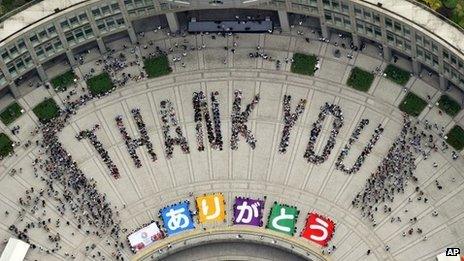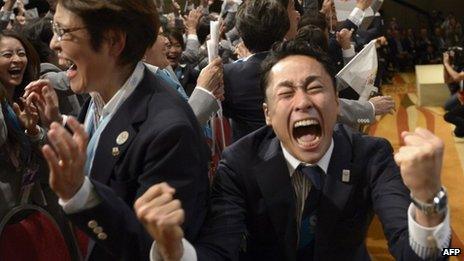Tokyo 2020: Japan's capital celebrates Olympics win
- Published

Tokyo celebrates - but what about the tsunami-ravaged north-east coast?
For months journalists like me have been speculating on whether Tokyoites are really that enthusiastic about getting the Olympics.
Well today we got our answer. As the announcement came through from Buenos Aires, venues across the city burst into uproar.
I was at the Komazawa Gymnasium in the west of the city where a couple of thousand Olympic enthusiasts had stayed up all night. Japanese people are, by nature, quite reticent, but not this morning. As Jacques Rogge read out the name of the winning city they went berserk, jumping and shouting, crying and laughing.
A few hours later, standing in the rain in Shibuya, the city's busiest shopping district, I questioned early morning shoppers coming out of the train station. The ecstasy may have been more subdued, but the sentiment was the same.

After the euphoria comes the bill - $8bn
Hard as I tried I couldn't find anyone who thought it was a bad idea. So much for my journalistic cynicism.
Economists say Tokyoites have good reason to be cheerful. There's a lot of building to be done, and a lot of money to be spent.
Like any Olympics, the centrepiece will be an extravagant stadium. Tokyo's has been designed by British architect Zaha Hadid. Its futuristic curves fit nicely with Tokyo's Olympic slogan: "Discover Tomorrow."
But it comes at a huge price: more than $1.5bn. That is just a small part of the $8bn that will be spent on refurbishing old stadiums and building new ones. So it's all good news for Japan's construction companies, who have long been suckled on the teat of government spending.
Fukushima fury
But all this money going it to Tokyo may be less good news for other parts of the country, particularly the Tsunami ravaged north-east coast. In many areas re-construction has still barely begun.
And then there are the people of Fukushima. A friend of mine who was born there could hardly contain her fury this week when she heard Japan's Olympic committee chief Tsunekazu Takeda reassuring the IOC about Fukushima.
"Fukushima is a long way away," he said. "It is no threat to Tokyo."
"No threat to Tokyo maybe," my friend said. "But what about the people who live in Fukushima?"
About 100,000 people are still unable to go home because of the nuclear disaster that struck the Fukushima Daiichi plant more than two-and-a-half years ago. Many feel that the rest of Japan is already forgetting about them, and that the Japanese government only cares about getting the other nuclear power plants back on line.
If there is one positive thing for the people of Fukushima to come from the Olympic decision, it is that the world is now watching even more closely to see what goes on there. The Japanese government has seven years to contain and neutralise the disaster properly.
- Attribution
- Published7 September 2013
- Attribution
- Published8 September 2013